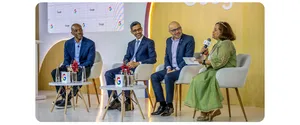More mental health resources for the moments you need them

The U.S. is facing an extraordinary mental health crisis. Meanwhile, searches for “mental health crisis” continue to climb year after year. In moments of crisis, people need easy access to resources that connect them to the help they need and support from people in their lives. For Mental Health Awareness Month in the U.S., here’s a look at new ways we’re helping people get that support. Plus, the work we’re doing with other organizations to make sure everyone has access to mental health resources.
Connect with people you trust in moments of crisis
People often turn to Google Search in some of their most vulnerable moments. In the context of a crisis, it is critical to instill hope and give simple information that is easy to act on. Suicide prevention information has been visible at the top of relevant search results for years. And last year in the U.S., it was updated to highlight the 988 Suicide and Crisis Lifeline, a network of more than 200 state and local call centers funded by the U.S. Department of Health.
Now we’re adding additional resources for people in crisis. When someone is in a vulnerable situation, it can be difficult to put this experience into words and know what to say to ask for help. To better support people reaching out to someone they trust, starting soon in the U.S., when someone searches for suicide-related terms, they’ll see a prompt with conversation starters they can send via text message. These pre-written prompts, developed in partnership with the expertise of the International Association for Suicide Prevention, reduce the stigma of reaching out to ask for help, which is shown to help people get support in moments of crisis. The prompts will appear below the 988 Suicide and Crisis Lifeline.
Mental health resources for young people
Mental health issues for teenagers are especially prevalent. The CDC has cited suicide as the second-leading cause of death for teens and young adults from the ages of 10 to 34. On YouTube, crisis support resource panels help young people connect with live support from crisis service partners for suicide, self harm and eating disorders.
Beyond crisis support resource panels for everyone, we recently updated our approach to eating disorder-related content. In order to protect viewers from harmful content, we’re removing certain content that shows or describes disordered eating behaviors such as binging or purging. We’re also adding age-restriction to videos that are centered on eating disorder recovery to viewers 18 years or older. And the crisis resource panel for eating disorders now appears underneath videos related to eating disorders, in addition to the search results, to reach even more people when they’re watching content on this topic. These changes will help make space for community and recovery, while continuing to protect viewers.

Support for organizations that provide mental health resources
To reach as many people as possible, we're expanding our work with mental health organizations — especially those focused on helping certain populations like children and veterans.
The Child Mind Institute helps children, adolescents and families struggling with mental health and learning disorders. To help them continue this important work, we’re granting $100,000 to support their day-to-day operations. Additionally, the Child Mind Institute and YouTube are working together to support content tailored for younger people struggling with mental health, such as the #YouGotThis video series for Mental Health Awareness Month. The campaign features celebrities and influencers sharing their own stories about the mental health disorders, doubts, and confusion they faced when they were young.
Another way we support these organizations is through Google.org grants and pro-bono support from Googlers participating in a Google.org Fellowship. With the help of a technical team of Google.org Fellows, The Trevor Project used AI to identify and prioritize high-risk contacts while simultaneously reaching more LGBTQ+ young people in crisis.
Veterans are another group disproportionately impacted by suicide — and they’re seeking help in record numbers. A team of nine Google.org Fellows are helping ReflexAI build HomeTeam, a tool that will equip more veterans to better support each other and encourage their peers to seek additional support when needed. Taking from evidence-based clinical practices and working with experts in the field, HomeTeam helps veterans learn practical skills, then apply those skills via AI-powered simulations in a private and safe environment.
Through the Google.org Ad Grants program, organizations are able to get high-quality, authoritative mental health resources in front of more people. And the WHO is bringing mental health guides in more than 25 languages to communities around the globe, reaching more than 14 million people through donated Google Search ads, resulting in 1 million visits to their website to learn more.
It’s always ok to ask for help
These organizations exist to support people who need mental health help. If you or a loved one are experiencing a mental health crisis, there are resources available to help from Google and many other trustworthy organizations.







